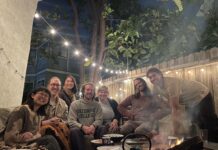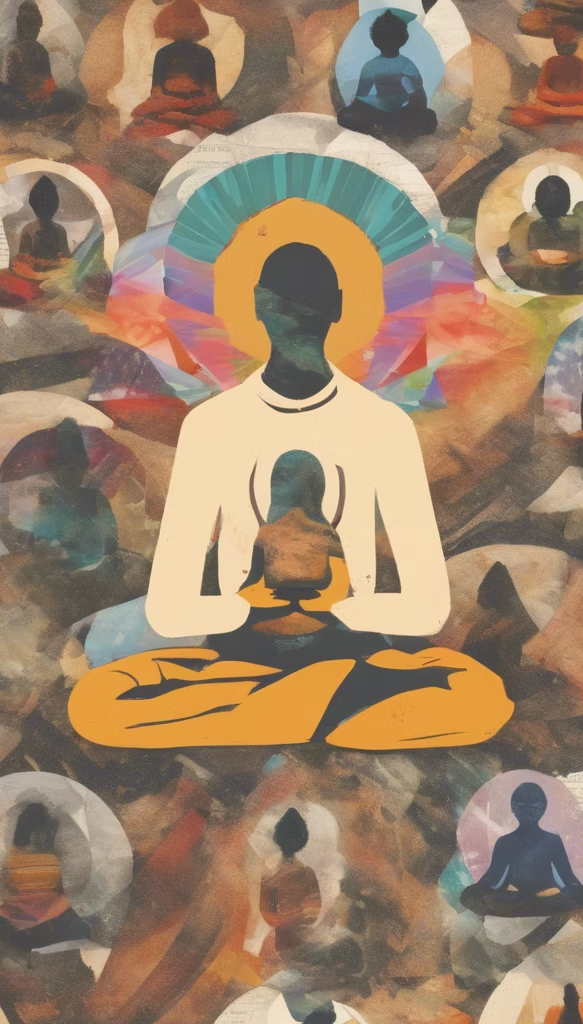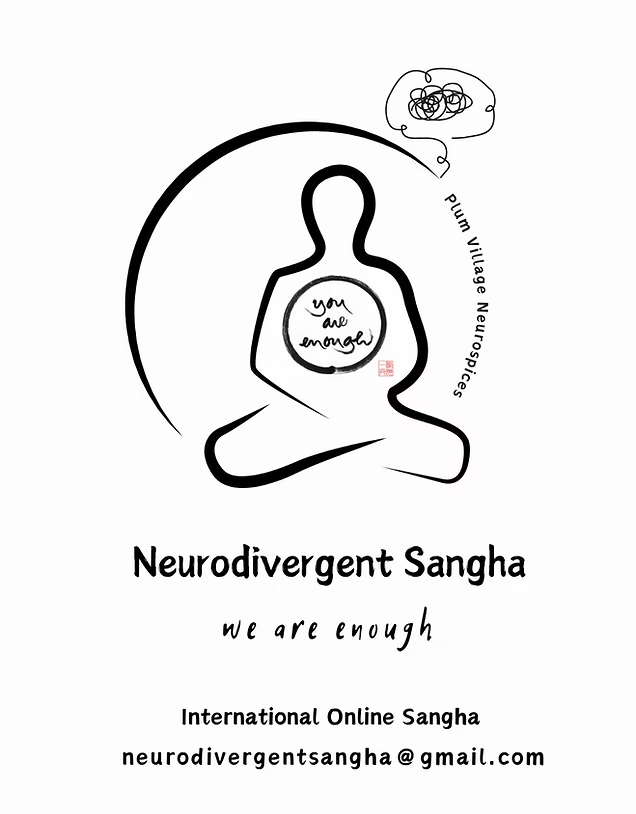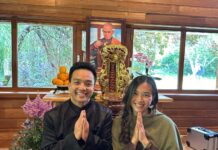In the summer of last year, a new Plum Village Sangha saw the light of day: the
Neurodivergent Sangha, bringing together neurodivergent practitioners. The Sangha
meets biweekly online and has a very youthful energy and many young practitioners.
The Wake Up team met with the founders and facilitators of the Sangha, to get to know
a bit more about neurodivergence, and what the fruits are of practicing together with
non-neurotypical friends.
Wake Up: Before we start, could you explain once more what ‘neurodivergent’
means?
Eli: We all have different brains. This is called ‘neurodiversity’. Being ‘neurodivergent’
means you process information in a different way. It does not mean being dysfunctional
or disabled, just having a brain that functions differently.
Julius: Neurodivergents have different styles of perception and of communicating about
their feelings. There exists a really broad spectrum, so one neurodivergent person can
be quite the opposite of another. In our Sangha we have many different flavors and
colours. Of course, every human being is different. And our Sangha members have
even brighter and more different colours, you could say.
Hugo: ‘Neurodivergent’ is the opposite of ‘neurotypical’. ‘Neurotypical’ is the way of
functioning that is considered ‘typical’, ‘normal’ or the ‘norm’ in society. I say
‘considered’, because we don’t really know what normal is. As Thay said: We are all
different kinds of flowers in the garden of humanity.
Wake Up: What about labels like ‘ADHD’, ADD’, ‘OCD’, ‘ASD’ (Autism Spectrum
Disorder), ‘AuDHD’ (ADHD combined with ASD)… which we commonly associate
with neurodivergence?
Eli: The labels end with ‘D’, which stands for ‘disorder’. They have been classified as
mental disorders, but we don’t see them as disorders. The brain differences of
neurodivergents have been clearly demonstrated. They are different from other mental
conditions and diagnoses. Moreover, new labels come up all the time!
Wake Up: Who can join your Sangha?
Hugo: You just need to identify as neurodivergent. You don’t need a formal diagnosis.
Julius: Not everyone mentions their diagnosis in our Sangha. You can share about
them, but you don’t have to, as some may prefer not to identify with them too much.
Julius: What is important to know, is that this is not a way to get to know more about
neurodivergent people. Our Sangha is only for people who are neurodivergent
themselves. It is not for those who have a neurodivergent family member or are an ally
in a different way. In this way we keep the Sangha as a safe sharing space for people
who identify as neurodivergent.
Julius: If you are not sure whether this Sangha is for you, you can always send us an
email. Feel free to ask us anything!
Wake Up: Are there any differences in the way you practice together?
Hugo: Our Sangha operates in the same way as other Sanghas. We do guided
meditation and Dharma sharing. Sometimes people may start feeling overwhelmed due
to their neurodivergence, and then we take care of this.
Hugo: We learned to say at the beginning of the session exactly how long it will last.
Because of their neurodivergence, some people need the exact timing. Our sessions
are also not longer than 90 minutes, because not everyone can concentrate longer than
that.
Julius: We use the basic practices of Plum Village, but there are more colours and
flavors to it. There is more creativity, especially when Hugo facilitates.
Hugo: I try to mix in some art therapy and offer drawing and coloring meditation, etc.
Eli: My co-facilitators also offer wonderful guided meditations helping us to accept
ourselves with gentleness and self-compassion.
Wake Up: What do you mean when you say people can get overwhelmed?
Julius: As neurodivergent people process perceptions differently, it is sometimes easier
for them to get overwhelmed in this hectic world.
Wake Up: Why did you want to have a Sangha for neurodivergent people?
Hugo: It is easier to share about our neurodivergence with people who are also
neurodivergent, and who have been through similar experiences. It feels safer.
Eli: In this Sangha, we can talk freely about our issues. In a regular Sangha, I didn’t
always feel understood. I was ‘the weirdo’, and most of the time I felt judged. In
neurotypical spaces we have to explain our neurodivergence to people every time. It’s
so nice to have this space where we can feel seen and understood. I never felt more
safe than in the Neurodivergent Sangha.
Hugo: We have nothing to hide here!
Julius: Many neurodivergent people have had a lot of hardship that they have not been
able to share about. So our Sangha is a space to share hardship. But people are also
invited to see the beautiful sides. Being neurodivergent is not bad, it’s just different. We
just blossom differently.
Hugo: In our Sangha we have a lot of compassion for each other, and we listen deeply,
because we can relate to each other’s difficulties more easily. And we also celebrate
each other’s victories. When we manage to overcome our challenges, we cheer for
each other, because we know how hard it can be.
Eli: For instance, there was someone in our Sangha who was really struggling with his
mattress. He had to change his mattress six times. When he finally found the right
mattress, we were so happy for him. Most neurotypicals wouldn’t understand how
complicated something like that can be. For them it may not seem like a big deal.
Wake Up: What can we do to make our Sanghas more welcoming for
neurodivergent people? Do you have any advice for us?
Julius: Listen deeply, and be open. That’s a general advice, not something specifically
for neurodivergent friends. If you feel someone processes information or sees the world
differently, listen and ask how something is for them, and how you can support them.
Hugo: Try to be flexible. For instance, if during Dharma sharing someone starts to feel
agitated or overwhelmed, they should be free to leave if they need to, even though we
generally try to protect the energy and stay together.
The neurodivergent person also has the responsibility to tell the facilitator if they are
neurodivergent and have a specific need. And the Sangha should be open to this. It has
to come from both sides.
Wake Up: Final question: how can we make the world a better place for
neurodivergent folks?
Hugo: By bringing more awareness and informing people who don’t know about
neurodivergence. A lot of the difficulties, if not all of them, come from ignorance. If
people would be more aware of our struggles, it would be so much easier.
If there would be less ignorance, there would be less judgement. For instance, I myself
would not share my diagnosis with a neurotypical person, because I know they would
be afraid of it. They would not understand, and it could be the source of judgment and
reaction.
Julius: We need more deep listening and loving speech. We should try to understand
people, people in general and neurodivergent people specifically. More deep listening to
my neurodivergence would have helped me a lot in my life.
Eli: My advice for neurodivergents is: stop hiding. I hid my first diagnosis for 15 years,
even to my closest friends. When I was a kid, there was no such thing as women on the
spectrum. Nowadays, there are many new approaches, techniques and therapies for
neurodivergence. It explains so much about my life. It helps me accept and reconcile
with myself, and helps me explain myself and be accepted by others. This is who I am.
Don’t judge me.
Now I am so proud to have this neurospiciness. I don’t have to hide anymore. I want to
offer this journey of acceptance to everyone. We may be misunderstood by society, but
we are cool, and very talented!
Hugo: Be beautiful, be yourself.
Eli: We are enough!
Wake Up: Thank you very much for these beautiful sharings! We wish you all the
best with the Neurodivergent Sangha. Thanks for spicing things up 🙂
To find out more about the Neurodivergent Sangha, go to
www.neurodivergentsangha.org




















